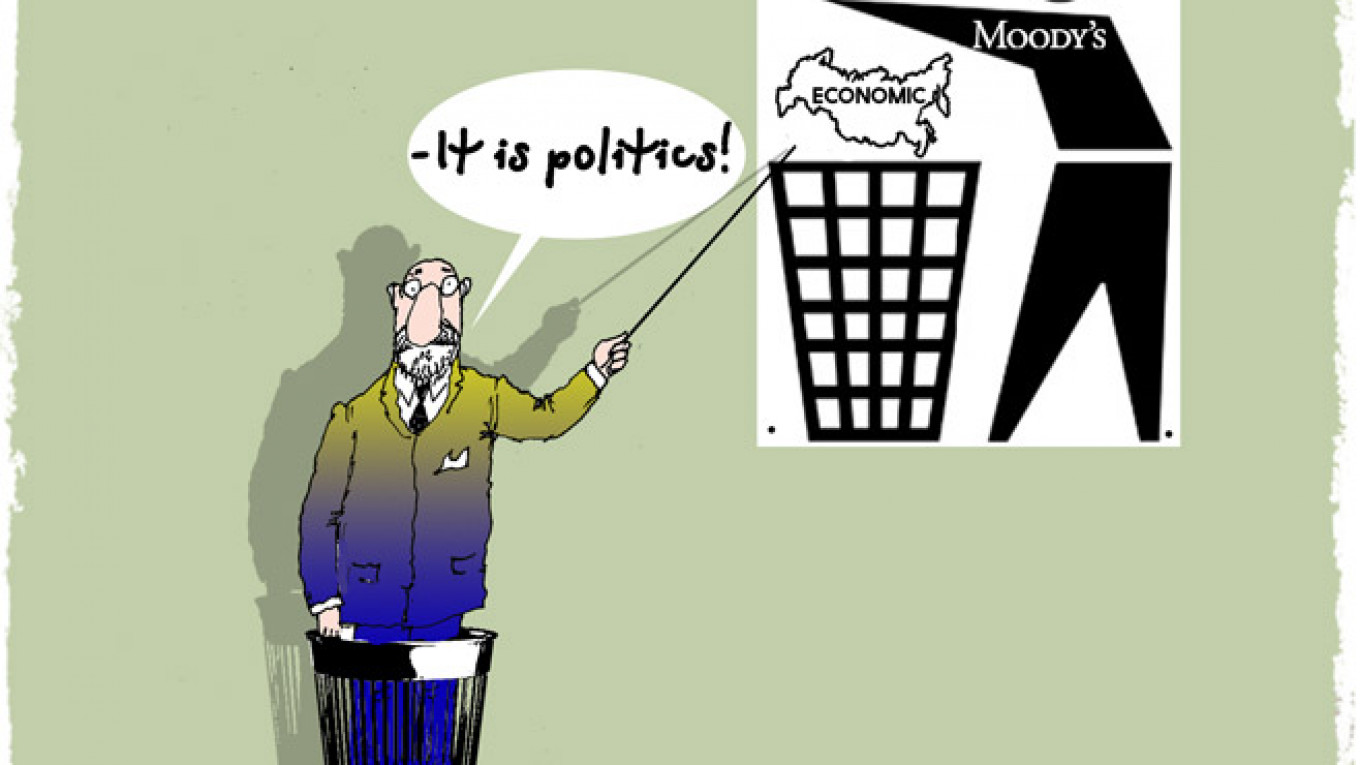It should come as a surprise to no one that Moody's Investors Service finally officially downgraded Russia's bonds to junk status. Moody's has been threatening as much for several months now. Yes, there has been a very modest rebound in oil to over $60 a barrel over the past week or two, but it's still very much an open question how much longer that rally will last.
Anyway, the positive influence of the recent recovery has been totally overwhelmed by the much larger negatives of the past six months for the Russian economy. All things being equal, it appears that Moody's made the right call.
In another move that ought to surprise no one, the Russian government's reaction was a self-pitying one that placed the emphasis squarely on politics. Russian Finance Minister Anton Siluanov bemoaned the fact that Moody's "ignored all the information provided to it," that its outlook was "extremely pessimistic," and that Moody's "based its decision primarily on political factors."
What was Moody's "extremely pessimistic" outlook, the one that was so badly corrupted by politics that Russian government officials think we shouldn't trust it? Moody's thinks that Russia will experience a deep recession in 2015 and that the contraction will continue in 2016.
Furthermore, Moody's thinks that an economy-wide crisis of confidence will "constrain domestic demand" and "exacerbate the Russian economy's already chronic underinvestment." Lastly, Moody's thinks that the balance of economic risks are "biased to the downside."
Notice what Moody's didn't mention. It didn't mention all of the things that one would usually associate with a "political" criticism of Russia: the stifling hand of the state bureaucracy, the cult of personality, the unreliability of Russian courts and the omnipresence of corruption.
In fact, what was really noteworthy from Moody's analysis was the relative paucity of politics. All Moody's said was that there was a small, but growing, chance that the authorities would react to Western pressure by unilaterally refusing to repay their debts.
Moody's isn't making that up: "punishing" the West by refusing to pay back loans is exactly the sort of thing that Sergei Glazyev and various other hawks have been publicly begging President Vladimir Putin to do. Someone, it seems, was paying attention to their recent tantrums.
It's very telling, though, that the Russian government's response to a largely accurate economic criticism was to throw up its hands and say, "but this is really all about politics!" In Russia there's usually an assumption, from both government supporters and opponents alike, that economics and politics are completely inseparable, that any division between the two is imagined and artificial.
Obviously there are closer links between business and government in modern Russia than in most countries, but I not only think it's possible to make distinctions between the political and economic realms, I think it is absolutely vital to do so.
In the past, when I said things like "Russia's consumer market is growing" (back when it actually was growing), I would get outraged responses from anti-Putin activists berating me for my "defense" of the regime's horrible record.
Now, when I say things like "Russian inflation is really high and probably won't come down anytime soon" (which seems quite obviously true), I get similarly outraged responses from pro-Kremlin trolls saying that I am in league with the dark forces who are "attacking" and "humiliating" the motherland.
What neither group would ever admit is that economics and politics are distinct enough spheres that you could have good performance in one while having poor (indeed horrible) performance in the other.
Why is it so important to spell this out? Well, at some point in the next year or two it seems likely that the price of oil will go back to somewhere in the $90 to $100 range. When that happens, the ruble will strengthen, the Russian state's balance sheet will improve, and the economy will start to grow a little bit more swiftly.
If you stick with a Moody's-like analysis of Russia, you won't have any problem incorporating this new information, as these are all purely economic phenomena that don't have any deeper meaning or significance. A government budget is either balanced or it isn't.
But others who take a more politics-heavy approach to Russia will either start to cheerlead these modest changes ("this is all part of Putin's genius plan!"), or they will try to pretend that they don't exist.
There is plenty that one can criticize in today's Russia: both the economy and the political system have almost endless litanies of problems that seem to get even longer every day. But while understandable, the urge to lump everything together needs to be resisted because it leads to sloppy thinking and even sloppier policy analysis.
Mark Adomanis is an MA/MBA candidate at the University of Pennsylvania's Lauder Institute.
A Message from The Moscow Times:
Dear readers,
We are facing unprecedented challenges. Russia's Prosecutor General's Office has designated The Moscow Times as an "undesirable" organization, criminalizing our work and putting our staff at risk of prosecution. This follows our earlier unjust labeling as a "foreign agent."
These actions are direct attempts to silence independent journalism in Russia. The authorities claim our work "discredits the decisions of the Russian leadership." We see things differently: we strive to provide accurate, unbiased reporting on Russia.
We, the journalists of The Moscow Times, refuse to be silenced. But to continue our work, we need your help.
Your support, no matter how small, makes a world of difference. If you can, please support us monthly starting from just $2. It's quick to set up, and every contribution makes a significant impact.
By supporting The Moscow Times, you're defending open, independent journalism in the face of repression. Thank you for standing with us.
Remind me later.






